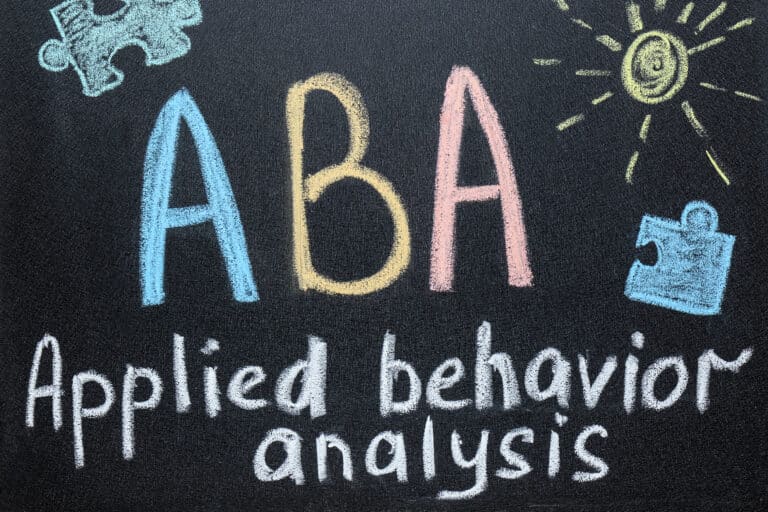
Applied behavior analysis, or ABA, helps people with autism gain life skills and discard injurious behaviors. This includes increased language and communication mastery, social capabilities, and memory. With positive reinforcement and acknowledgment of your child’s skill progression, ABA therapy allows children to grow in a safe and positive environment.
ABA is a researched and solidified method to help children on the autism spectrum progress; continue reading for more information on the benefits of this program.
In this blog, we’ll answer the following questions:
- Who administers ABA therapy?
- What is the controversy around ABA therapy?
- Is ABA therapy the best treatment for autism?
- Is ABA effective long term?
- What age is ABA therapy most effective?
- How do autistic people feel about ABA?
Who Administers ABA Therapy?
While licensed ABA therapists conduct direct therapy, it’s overseen by board-certified behavior analysts or BCBA. BCBAs work behind the scenes to create patient goals and solidify the process of ABA therapy. This allows ABA therapists to then conduct face-to-face treatment. The behavior analyst certification board additionally studies behavior patterns, increasing individualized plans’ accuracy.
What is the Controversy Around ABA Therapy?

In its earliest stage of creation, ABA programs used a punishment-reward system, where punishments were given to autistic children when they were not acting in a desired way. It was seen as discouraging and damaging, as ABA therapists failed to help develop productive skills; but rather only repeatedly criticized patients on what they shouldn’t be doing.
But today, punishments are entirely excluded from any aspect of ABA therapy. Learning is now less repetitive and integrates fun and engaging strategies to make it a positive learning experience. Researchers, such as Catherine Lord, Ph.D., explain that if ABA therapy is “humorless,” then it’s just “bad teaching” to blame, “not ABA.” Therapy sessions today are interactively play-based instead of seated intervention. Additionally, electric shock therapy has been eliminated and is no longer a part of the ABA protocol. While ABA carried controversy in the past, that is now recognized as outdated information.
Is ABA Therapy the Best Treatment for Autism?
ABA is the most highly recognized and recommended treatment within the medical community for those with autism. This is because it uses techniques to teach necessary skills and behavior interventions and support them long-term.
Compared to other treatment plans, ABA therapy has proven to be the most effective treatment route when supporting those with autism. It’s an “evidence-based” treatment, meaning it has passed all tests concerning its effectiveness, quality, and usefulness.
Is ABA Effective Long Term?

The effects of applied behavioral analysis have been researched to have long-lasting benefits. As this therapy can work on essential life skills from a young age, these habits then carry into adulthood. This can lead to increased employment opportunities, more successful social interactions, high intellectual functioning, more functional daily living skills, and better overall quality of life. Researchers suggested that 90% of children showed significant growth after ABA therapy. This program is typically long-term and “intensive,” so its efforts are not quickly dissolved.
What Age is ABA Therapy Most Effective?
ABA therapy is positively applicable at any age. But, if your family has begun early intervention, then ages 2-6 are most effective. This is because ABA therapy is then able to apply communication and life skills from an early age, making it easy to carry along those habits into adolescence and adulthood.
This age range can also allow children to be more successful in preschool or elementary school as they learn to follow instructions with ease. If your child is outside of this age group, don’t be discouraged! Continue to seek ABA therapy practice, each individual child is unique and able to benefit from ABA in different stages of life.
How Do Autistic People Feel About ABA?
Some people have labeled ABA therapy as harmful. But opposingly, most autistic people recognize that this therapy is correcting dangerous behaviors; not just trying to change who an autistic person is. Skills learned in this therapy can help those with autism spectrum disorders:
- Feel less frustrated
- Regulate emotions and mood
- Gain independence
- Increase social skills and communication
- Reduce aggression and inattentiveness
- Learn self-care skills
- Decrease problem behaviors
While each person, specifically those living with autism, is entitled to view ABA therapy as they please, it’s overall seen as a favorable use of resources.






